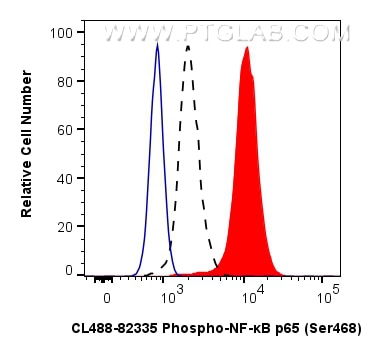Anticorps Recombinant de lapin anti-Phospho-NF-κB p65 (Ser468)
Phospho-NF-κB p65 (Ser468) Recombinant Antibody for FC (Intra)
Hôte / Isotype
Lapin / IgG
Réactivité testée
Humain, souris
Applications
FC (Intra)
Conjugaison
CoraLite® Plus 488 Fluorescent Dye
CloneNo.
6N1
N° de cat : CL488-82335
Synonymes
Galerie de données de validation
Applications testées
| Résultats positifs en FC (Intra) | cellules NIH/3T3 traitées à la calyculine A, |
Dilution recommandée
| Application | Dilution |
|---|---|
| Flow Cytometry (FC) (INTRA) | FC (INTRA) : 0.13 ug per 10^6 cells in a 100 µl suspension |
| It is recommended that this reagent should be titrated in each testing system to obtain optimal results. | |
| Sample-dependent, check data in validation data gallery | |
Informations sur le produit
CL488-82335 cible Phospho-NF-κB p65 (Ser468) dans les applications de FC (Intra) et montre une réactivité avec des échantillons Humain, souris
| Réactivité | Humain, souris |
| Hôte / Isotype | Lapin / IgG |
| Clonalité | Recombinant |
| Type | Anticorps |
| Immunogène | Peptide |
| Nom complet | v-rel reticuloendotheliosis viral oncogene homolog A (avian) |
| Masse moléculaire calculée | 65 kDa |
| Poids moléculaire observé | 75 kDa |
| Numéro d’acquisition GenBank | BC011603 |
| Symbole du gène | NF-κB p65 |
| Identification du gène (NCBI) | 5970 |
| Conjugaison | CoraLite® Plus 488 Fluorescent Dye |
| Excitation/Emission maxima wavelengths | 493 nm / 522 nm |
| Forme | Liquide |
| Méthode de purification | Purification par protéine A |
| Tampon de stockage | PBS with 50% glycerol, 0.05% Proclin300, 0.5% BSA |
| Conditions de stockage | Stocker à -20 °C. Éviter toute exposition à la lumière. Stable pendant un an après l'expédition. L'aliquotage n'est pas nécessaire pour le stockage à -20oC Les 20ul contiennent 0,1% de BSA. |
Informations générales
Nuclear factor kB (NF-kB) is a collective term for a small family of dimeric transcription factors [comprising p65 (RelA) and RelB, c-Rel, p50/p105 (NF-κB1), and p52/p100 (NF-κB2)]. All NF-κB proteins share a Rel homology domain (RHD), which is responsible for DNA binding and dimerization. Only p65, RelB, and c-Rel contain potent transactivation domains within sequences from the C-terminal to the RHD. Exterior signals lead to the phosphorylation and degradation of the inhibitory complex IκB, which is modulated by the IκB kinase (IKK), and its degradation allows for the release of the typical NF-κB heterodimer, p65/p50, to translocate into the nucleus. NF-κB binds to its cognate DNA elements and can transcriptionally activate different target genes among which 200-500 genes have been implicated in cell survival/apoptosis, cell growth, immune response, and inflammation.


